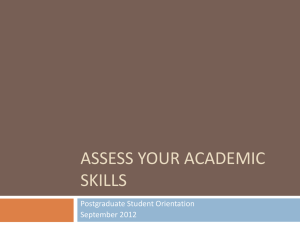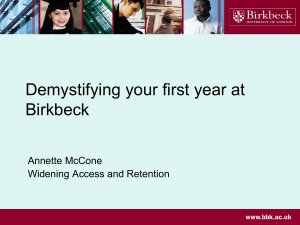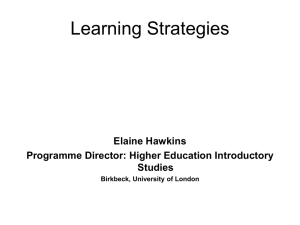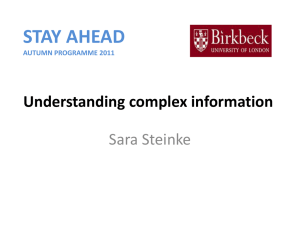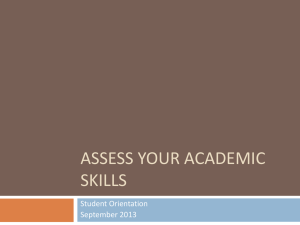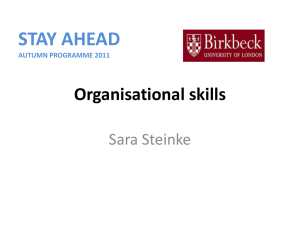Further Information about the Department of Politics
advertisement
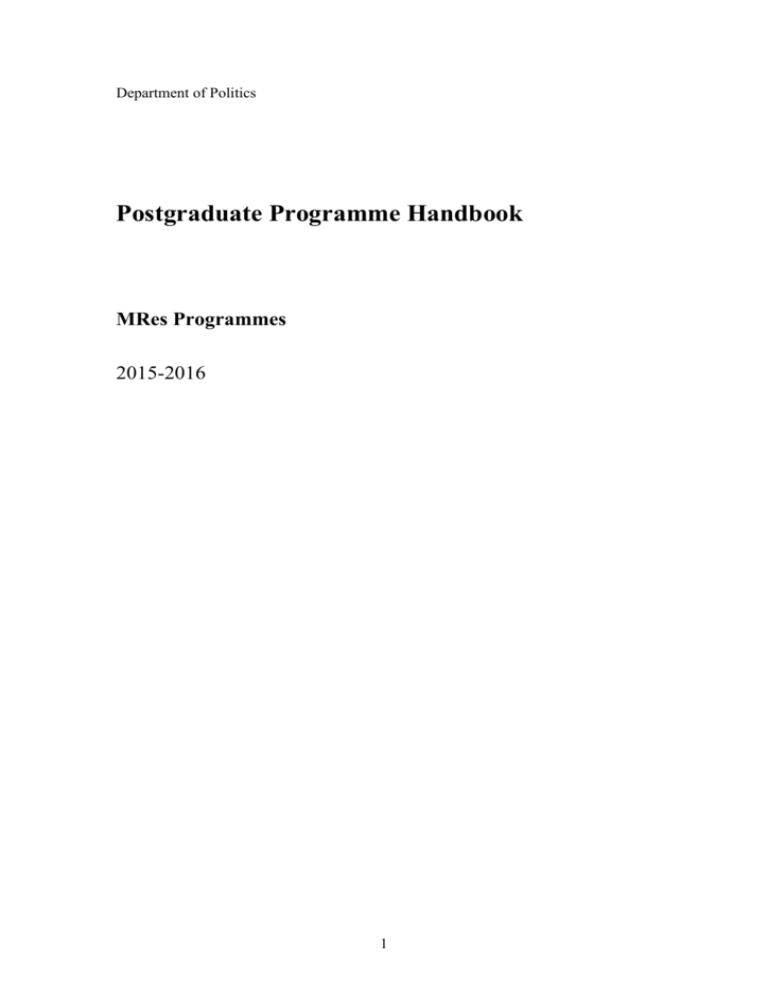
Department of Politics Postgraduate Programme Handbook MRes Programmes 2015-2016 1 Contents Introduction to the Department of Politics Introduction to your Programme of Study Questions about your programme Core modules Option modules The dissertation Reading Week and Workshop Week Break in Studies Policy and Withdrawal from a Module or Programme Pass requirements and degree classifications Results Repeating modules and intermediate awards From MRes to PhD Further Information about the Department of Politics Full-time academic staff Emeritus and visiting staff Professorial Fellows Administrative Staff Aims and objectives The Centre for the Study of British Politics and Public Life Location Access Department website Departmental blog and twitter eRegisters Keeping in touch Student Support and Disability Advice Student Support Study Support The Learning Development Tutor English language support for non-native speakers Disability & Dyslexia Service The Disability & Dyslexia Service and Mental Health Service Access at Birkbeck The Disabled Students Allowance Support in your Department Support in IT Services and Library Services Examinations and Assessments Specific Learning Difficulties (e.g. Dyslexia, Dyspraxia) Examinations Further information Annex Useful contacts Disclaimer and useful links 2 3 Introduction to the Department of Politics Politics has been part of our teaching provision at Birkbeck for nearly two centuries. Although George Birkbeck argued against ‘interference with political questions’ at the inaugural meeting of the London Mechanics Institute – founded in 1823 and renamed Birkbeck College in 1907 – the political reformer and archivist, Francis Place, ensured that the working men and women who came to this new institution had an opportunity to learn about politics. Political economy was covered in the College’s early curriculum by eminent lecturers such as William Ellis, Robert Wilmot Horton and Thomas Hodgskin alongside specialist provision for civil servants. Notable students in this foundational period included Karl Marx, who attended Hodgskin’s lectures on workers in the capitalist system, Sidney Webb, co-founder of the London School of Economics and Ramsey MacDonald, the first Labour Prime Minister. Building on this legacy, Birkbeck’s School of Sociology and Politics was founded in 1972 by Bernard Crick, a celebrated scholar of political liberalism, Paul Hirst, a social theorist who did ground breaking work on globalisation among many other topics, and Sami Zubaida, a pioneer in the study of Middle East politics and an expert on, among other things, the political sociology of food and culture. The Department of Politics – as it was renamed in 2009 – has grown considerably over the last forty years. Birkbeck launched its flagship BA Politics, Philosophy & History (PPH) in 1988 and steadily increased the scope of its undergraduate and postgraduate provision in the 1990s. Today, the Department offers two certificate courses, three undergraduate degrees, 14 taught postgraduate programmes and a vibrant MPhil/PhD programme. Located in 10 Gower Street and situated within the School of Social Sciences, History and Philosophy, we are a community of over 500 students, 18 full-time faculty members, 18 visiting or sessional staff and five administrators. In keeping with our history, the Department’s approach to teaching combines the practical and the provocative. We still teach political economy, social and political theory and public policy alongside cutting edge issues in comparative, European and international politics. Our students continue to excel in the study and practice of politics and can be found in Parliament, the Shadow Cabinet, the senior civil service, non-governmental and international organizations and leading European universities. While much has changed at Birkbeck over the last two hundred years, its mission to provide high-quality, research-led teaching to busy mature students in the evening has not. Our teaching in the field of politics has always been innovative and interactive and it remains so. This is due to the challenges of teaching students at the end of their working day and also because of the high-levels of enthusiasm they bring to the classroom. On any given evening, lecturers in the Department of Politics teach some students who have little prior knowledge of the subject under discussion and others who have direct and sometimes very personal experience of such issues. Both groups share a deep determination to learn, which is matched by Birkbeck’s reputation for world-class research-led teaching. 4 Introduction to your Programme of Study Questions about your programme If you have questions about your degree programme, please do not hesitate to contact the Politics Office and/or your Programme Director. You can contact the Department Office by telephone (+44 [0] 20 7631 6780 / 6789) or email (politics@bbk.ac.uk). The Programme Director for all MRes programmes is Dr Rosie Campbell (r.campbell@bbk.ac.uk). Your Programme Director serves as your personal tutor so please do see her if you are having any difficulties with your studies. She will also act as the supervisor for your dissertation or arrange for supervision by another member of the Department who has particular expertise in your proposed area of research. Core modules Your degree is divided into four modules that each count for 30 credits and the dissertation which counts for for 60 credits to make up the 180 credits required for your degree. The structure of your programme is as follows. MRes Programme Title Global Politics Public Policy and Management Social and Political Theory MRes Politics Full-time students and first year-part time students International Political Economy Full-time students and second year-part time students Global Governance Qualitative Social Research Introductory or Intermediate Quantitative Social Research* Public Management: Theories and Innovations Public Policy: Ideas, Institutions, Interests Qualitative Social Research Introductory or Intermediate Quantitative Social Research Political Theory Political Sociology Qualitative Social Research Introductory or Intermediate Quantitative Social Research Qualitative Social Research Introductory or Intermediate Quantitative Social Research Option from list below Option from list below Optional modules for MRes Politics students can normally be chosen from any of the postgraduate modules offered by the Department of Politics. The following is an indicative list of options. Comparative Government and Policy in Europe * All students will initially be enrolled on to Introductory Quantitative Social Research; a short test will be administered at the start of the academic year to determine who is moved on to Intermediate Quantitative Social Research. 5 Emerging Powers in World Politics Global Conflict, Security and Humanitarianism Global Governance Intermediate Quantitative Social Research International Political Economy Islamist Movements Middle East Politics Modern British Politics Nationalism and Ethno-Religious Conflict Political Sociology Political Theory Population and Environmental Politics Public Management: Theories and Innovations Public Policy: Interests, Ideas and Institutions The European Union: Integration, Politics and Policy The Government and Politics of the United States The Politics Of Population Change: Immigration, Aging And Conflict War, Politics and Society For an up to date list and details about how to select choices, please see: http://www.bbk.ac.uk/politics/study-here/postgraduate-degrees Subject to the approval of their Programme Director, students can take one of their optional modules (i.e. 30 credits) from another department at Birkbeck. The Dissertation The dissertation counts for one-third of the entire degree i.e. 60 credits. It is a long written piece of research with a minimum length of 12,000 words and a maximum length of 15,000 words including all footnotes, references and appendices. This research is conducted independently but you will be assigned a supervisor by your Programme Director to offer advice and guidance via workshops and one-on-one supervision meetings. All dissertations must be submitted by Thursday 15 September 2015. To submit the dissertation you must upload an electronic version to the Moodle site for your dissertation (see www.moodle.bbk.ac.uk) and submit one hard copy (spiral bound) to the Department Office at 10 Gower Street. The topic for your dissertation, which must be relevant to your degree programme, must be approved in advance by your Programme Director. To have your topic approved you must submit a dissertation proposal form and await confirmation from your Programme Director. The deadline for submitting the dissertation and ethics proposal forms varies from programme to programme. Your Programme Director will be in touch to confirm the deadline but it is expected that all dissertation and ethics proposal forms are submitting by the end of spring term at the very latest. All research that is carried out by Birkbeck students that involves intervention or interaction with human participants, or the collection and / or study of data derived from living human participants (e.g. conducting research interviews), requires ethical approval. Dissertation proposal forms and ethical approval forms along with more detailed guidance on writing dissertations are available from the Department website: 6 http://www.bbk.ac.uk/politics/study-here/postgraduate-degrees Reading and Workshop Weeks Reading Week Reading Week is held in both the autumn and spring terms. Lectures and seminars do not run in Reading Week, the purpose of which is to give you an opportunity to revise the material covered in the first half of the module and to prepare for the second half. This is also an excellent opportunity for you to make a start on essays and other coursework. Workshop Week In Workshop Week, which is held in both the autumn and spring terms, lectures and seminars for specific modules are replaced by general study skills sessions and other events. These sessions cover topics such as essay writing, exam preparation and how to go about researching and writing your dissertation. Other events include outside speakers from the world of research and/or politics. The Departmental Office will provide you with details in due course. Break in Studies Policy and Withdrawal from a Module or Programme Withdrawing from a module Students who wish to withdraw from the examination for a module should inform their Programme Director in advance of the examination. Students who do so without claiming mitigating circumstances that are then accepted by the Politics Exam Board will fail the module and be given one additional attempt to pass the module via retake or reassessment (see section of repeating modules below). Students who withdraw from a module and claim mitigating circumstances that are approved by the Politics Exam Board will be offered either alternative assessment (see section of repeating modules below) or two additional chances to pass the module at the discretion of the Politics Exam Board. Please note that where a first-year, part-time student withdraws from a module, it falls to the Politics Exam Board to decide whether this module must first be passed before the student can proceed to the second year of study. For further details on mitigating circumstances, please see: http://www.bbk.ac.uk/mybirkbeck/services/administration/assessment/exams/mitigati ng-circumstances Withdrawing from your dissertation Students who wish to withdraw from their dissertation must inform their Programme Director before the dissertation is due. Students who do so without claiming mitigating circumstances that are then accepted by their Programme Director will be given one additional attempt to pass. Students who claim mitigating circumstances that are approved by their Programme Director will be offered two remaining chances to pass the dissertation. Deferred dissertations can be submitted by 15 May (or the Friday before if 15 May is a Saturday or Sunday) or September 15 (or the Friday before if 15 September is a Saturday or Sunday) in the year following deferral. 7 For further details on mitigating circumstances, please see: http://www.bbk.ac.uk/mybirkbeck/services/administration/assessment/exams/mitigati ng-circumstances Break in Studies College regulations permit a student to suspend studies for a maximum of two years in total during their programme of study. Please see your Programme Director and the Department Office if you are considering a break in studies. Further details on relevant College regulations can be found here: http://www.bbk.ac.uk/mybirkbeck/services/rules/bis.doc/view Withdrawing from your programme If for any reason you decide to withdraw from your degree on a permanent basis, we hope you will talk to us first. Students choose to withdraw for a wide range of reasons and it may be that we will be able to make arrangements to help you complete your course. For further information, please see: http://www.bbk.ac.uk/mybirkbeck/services/administration/withdrawing Please note that if you are requesting a refund, a medical certificate is required, where applicable. If you withdraw after the start of term, you may be liable for fees. For further details, please see: http://www.bbk.ac.uk/mybirkbeck/services/rules/College-Fees-Policy.pdf Results When you submit coursework during the year you can usually expect to receive a mark and feedback within three weeks. All marks are provisional until they are approved by the Politics Exam Board, which meets in July and November of each year. Exam results are released after the July meeting of the Politics Exam Board and dissertation results are released after the November meetings. These results will be made available to you via your My Birkbeck Profile (http://www.bbk.ac.uk/mybirkbeck/) but please note that it can take up to several weeks after the Exam Board meets until marks for all students are entered on this system. Pass requirements and degree classification Assessment usually involves a combination of coursework and exams but it varies from one module to the next. Full details concerning assessment are provided in the relevant module book; this module book will usually be distributed in the opening class for the module and an electronic copy can be found on the Moodle site for the module in question (www.moodle.bbk.ac.uk). The final grade for each module is classified according to the scheme below. Modules and the dissertation must be taken and passed with a mark of at least 50 to complete the degree. 8 Grade 00-49 50-59 60-69 70-100 Classification Fail Pass Merit Distinction The final grade for your degree is based on the average mark for your modules weighted according to credits i.e. the grade for the 60 credit dissertation counts for double the grade for 30 credit core and option modules. Where a student’s average result is within 2% of the next (higher) degree classification, the Politics Exam Board will consider the number of modules and credit for which the assessment falls within a particular class. If a candidate has a preponderance of module results in a higher class than that determined by the average result, the higher class of degree may be awarded. Repeating modules and intermediate awards If you fail a module you will be offered a second and final attempt to pass the module. This second attempt will take the form of a ‘re-take’, ‘re-assessment’ or ‘alternative assessment’ at the discretion of the Politics Exam Board. A re-take requires attendance at the module’s lectures and seminars as well as another attempt at the assessment, whereas “re-assessment” is where a student attempts only the failed element(s) of a failed module. Please note that students who retake the module will be liable to pay fees for this course. Alternative assessment allows a student to submit additional coursework in lieu of a second attempt at an exam and can be offered only in those cases where a student has applied for mitigating circumstances and this claim has been accepted by the Politics Exam Board. For further details on mitigating circumstances, please see: http://www.bbk.ac.uk/mybirkbeck/services/administration/assessment/exams/mitigati ng-circumstances Intermediate awards can be offered by the Examinations Board when a student fails to complete the full requirements for the degree. Qualification Postgraduate diploma Postgraduate certificate Credits needed 120 60 From MRes to PhD Students on the MRes programme learn the basics of research design and analysis, conduct their own small research projects and learn how to evaluate quantitative and qualitative methods used in published research. This is excellent training for PhD study and we welcome applications to our PhD programme from students who excel in their postgraduate studies at Birkbeck. Our MRes programmes are recognised by the Economic and Social Research Council (ESRC) as appropriate postgraduate research training and meet the requirements of applying for an ESRC funded PhD in politics in +3 mode i.e. to cover the cost of completing doctoral studies in three years. 9 Applications for ESRC funding must be received by the Department of Politics by 31 January of the year in which you plan to commence a PhD. A limited number of fulltime and part-time College Research Studentships (fees-only) are available. If you are interested in applying for such funding, please get in touch with the MRes Director well in advance of this deadline. For more detail about applying to the PhD Programme including on funding opportunities, please see this link: http://www.bbk.ac.uk/politics/prospective-students/mphil-phd 10 Further Information about the Department of Politics Full-time academic staff Samantha Ashenden, BA (Kingston), MPhil (Cantab), PhD (Lond.) Senior Lecturer in Sociology Edwin Bacon, BA (Sheffield), MSocSc (Birmingham), MBA(London) PhD (Birmingham) Reader in Comparative Politics Antoine Bousquet, BSc (UCL), MSc (LSE), PhD (LSE) Senior Lecturer in Politics & International Relations Rosie Campbell, BA, MSc (Southampton) PhD (Lond) Reader in Politics Alejandro Colás, BSc (Bristol), MSc/MRes (LSE), PhD (LSE) Reader in International Relations Diana Coole, BA (Wales), MSc (London), PhD (Toronto) Professor of Political and Social Theory, Head of Department Dionyssis Dimitrakopoulos BA (Athens), Lic Spec (Brussels), PhD (Hull) Senior Lecturer in Politics Jason Edwards, BA (Oxon), MSc (Lond.), PhD (Lond.) Lecturer in Politics Ali Burak Güven, BSc, MSc (Middle East Technical University), PhD (Toronto) Lecturer in International Relations and International Political Economy Dermot Hodson BA (TCD), MA (College of Europe) and PhD (LSE) Reader in Political Economy Eric Kaufmann, BA (U. Western Ontario), MSc/MRes (LSE), PhD (LSE) Professor of Politics Joni Lovenduski BSc, MA (Manchester), PhD (Loughborough) Anniversary Professor of Politics Deborah Mabbett, BA (Victoria University of Wellington), D.Phil (Oxon) Professor of Public Policy Robert Singh, BA (Oxon), DPhil (Oxon) Professor of Politics David Styan, BA (SOAS), DEA (University of Bordeaux), PhD (LSE) Lecturer in Politics Matthijs van den Bos, MA (University of Amsterdam), MA (Utrecht University), PhD (University of Amsterdam) Lecturer in International Studies Barbara Zollner, MA (Bonn), PhD (SOAS) Lecturer in Islamic Studies Ben Worthy BA, MA, PhD (Manchester) Lecturer in Politics Emeritus and visiting staff Helen Bolderson Hussein Kassim Dr Sarah Childs Peter John Anne Showstack Sassoon Sami Zubaida 11 Professorial Fellows Tony Wright Administrative Staff Jane Halstead, Assistant School Manager Irene Breckon, Team Leader Nina Dartford, Administrator James Harding, Administrator Simon Abbott, Administrator Jean Dhanji, Administrator For an up to date list of staff members, including sessional teaching staff, see: http://www.bbk.ac.uk/politics/our-staff Aims and objectives The Department’s principal aims are: to enable mature students in full-time employment to undertake undergraduate and postgraduate study in Politics in fulfilment of the mission of the College; to enable students to develop and deepen their understanding of the conceptual and theoretical bases of the disciplines, their methods of inquiry, and their domains of knowledge; to offer students the opportunity to develop and deepen their skills of critical evaluation and analysis; to enable students to develop and extend their key skills as a foundation for personal development, employment or further academic study; and to contribute to the needs of local, national and international communities. Against the backdrop of these objectives, all graduating students from the Department will: be able to demonstrate the ability to apply critically the main theories, models and concepts used in the study of politics to the analysis of political ideas, institutions, processes, practices, developments and events; have developed an understanding and substantive knowledge of political processes and/or social and political theory; have extended and developed their analytical, evaluative and critical capacities; have developed transferable skills, including the ability to take responsibility for their own learning, learning how to learn, making oral and written presentations, planning and producing written assignments, working independently, and using information technology; and 12 have developed, where they complete a dissertation, the ability to undertake independent research. The Centre for the Study of British Politics and Public Life The Department of Politics is home to the Centre for the Study of British Politics and Public Life. The Centre aims to engage with key issues in British politics and public life through public debates, conferences, lectures, seminars and seminar series, and workshops. For further details please see: http://www.csbppl.com Location The Department is located at 10 Gower Street, and the Department Office on the ground floor is open for enquiries between 10:00 and 18:00 every weekday. Please press the buzzer for the Department Office for access. Members of staff have offices in 10 Gower Street or adjacent buildings. Much of the teaching is held in Birkbeck’s main building in Malet Street. Access You will need your Birkbeck ID card throughout your time at Birkbeck, since it acts as your College ID card, library card and access card. Once you have completed your enrolment, you will be entitled to an ID card. The simplest way to get your ID card is by ordering it via your My Birkbeck profile. Just upload a recent image of yourself and submit your order. Alternatively, visit the My Birkbeck Helpdesk where they can take a photo of you and produce a card. Please note you may be required to queue during busy periods. The ID card will remain valid for the duration of your studies, and you will not be issued with a new card for each subsequent academic year. See the following link for further details: http://www.bbk.ac.uk/mybirkbeck/services/you/cards If you lose or damage your Birkbeck student card, a replacement can be ordered for a non-refundable fee of £10.00. See the following link for further details: http://www.bbk.ac.uk/mybirkbeck/services/you/cards/replacement eRegisters All centrally-managed Birkbeck teaching rooms as well as those in Friends House and University Square Stratford (USS) are equipped with eRegisters card readers. In some of the larger lecture theatres you may see there is more than one card reader and these may be placed outside the room. Note that some teaching rooms are English Heritage-listed making it hard to make changes to the fabric of the rooms; it maybe that some of these rooms will not be equipped with card-readers. How do I record my attendance? In most Birkbeck rooms, at Friends House and University Square Stratford all you need to do is to touch your Birkbeck ID card against the reader and it will record your attendance. You can do this up to 15 minutes before the session starts or 15 minutes after the class ends; this will give you time to be seated and ready for the start of teaching. You do not need to touch in and out, one swipe is enough 13 The light on the card reader will change colour to show you that the swipe has been successful, in some locations there will be an audible ‘beep’ as well. If you have teaching sessions ‘back-to-back’ in the same venue you will need to touch in for each meeting If your teaching event is not in one of the rooms with an eRegisters card reader your attendance will be recorded in one of the following ways: On-line register: The member of teaching staff will use an on-line page from their My Birkbeck Profile for Staff to view a list of students expected at the event and will mark you present. This will be the typical pattern for smaller group teaching. Paper Register: The member of teaching staff will use a paper register or sign-on sheet to record who has attended class. This will then be used to update the central attendance register. Handheld Card Reader: We will be running a pilot scheme to try out small hand-held card readers that will be used by the member of teaching staff to register student attendance or used by students themselves to record attendance. You can use My Birkbeck Profile (http://www.bbk.ac.uk/mybirkbeck/my-birkbeckprofile) to view your historic attendance data using the eRegisters option. Currently there are two ways to see the data: ‘My weekly class attendance’ gives you a view similar to ‘My teaching timetable’. It shows you a summary of your attendance for for the last 7 days. ‘My attendance Summary’ gives you data for expected and actual attendance over the last 7 days; or the range of dates that you choose. This allows you to keep your own track of your attendance record. Teaching staff, tutors and some administrators will also be able to view this data. For further details, please see: http://bbk.ac.uk/eregisters Departmental website The Department website (www.bbk.ac.uk/politics) carries information about the Department, the staff, students and courses, and a notice board. Also available are learning resources, such as guidelines on essay and dissertation writing, course materials (access to which may require a password and username), and links to sites of particular interest to students in Politics. Students are advised to familiarise themselves with the website and to visit it regularly. Departmental blog and twitter See the departmental blog (www.10-gower-street.com) for updates by scholars from Birkbeck and beyond on political research in progress and commentary on current affairs. You can also follow the Department on twitter (https://twitter.com/bbkpolitics). 14 Keeping in touch Please check the Department website (www.bbk.ac.uk/politics) regularly for notices. Email is the main method by which we will contact you, so it is important that we get your email address right. Please check your My Birkbeck profile to ensure that we have the correct email address for you (http://www.bbk.ac.uk/mybirkbeck). Change of address You must inform the Registry if you change address at any time while studying at Birkbeck. You can do so online by logging into your 'MyBirkbeck Profile' (http://www.bbk.ac.uk/mybirkbeck/). Student Support and Disability Advice Student support As a Birkbeck student, you can get access to a range of support facilities including: Accommodation services Career services Counselling service Financial support Health services Nursery Students' Union For more details, please see: http://www.bbk.ac.uk/mybirkbeck/services/facilities Study support Birkbeck’s Centre for Transformative Practice in Learning and Teaching also offers a range of academic development workshops for students. Some courses are initially only available to first year undergraduates, but other students can join a standby list. All workshops are free of charge unless stated otherwise. Topics covered in these modules include: Moodle Reading skills Note taking Time Management Essay writing Academic English For more details, please see: http://www.bbk.ac.uk/learning-andteaching/supporting- learning/students-skills-development The Learning Development Tutor The Learning Development Tutor for the School of Social Sciences, History and Philosophy is Sara Steinke. Sarah is available for 1-to-1 meetings to 15 provide support and advice, and can help students with a range of study skills including: organisational skills time management critical reading note taking essay planning writing referencing exam preparation Sarah also provides workshops on these topics which run throughout the year. Details for these workshops can be found on the My Birkbeck website at http://www.bbk.ac.uk/mybirkbeck/ To contact Sarah, email s.steinke@bbk.ac.uk. To make an appointment for a 1-to-1 tutorial please log in to Moodle and click on the link to the School of Social Sciences, History and Philosophy module. For details about learning development workshops run by the School of Social Sciences, History and Philosophy, please see: http://www.bbk.ac.uk/mybirkbeck/global/workshop_timetable?orgunit=SS HP&action=view_all_workshops English language support for non-native speakers The Academic English module offered by the Centre for Transformative Practice in Learning and Teaching (see above) is open to native and non-native speakers. For a module aimed specifically at non-native speakers, the College runs a range of short modules designed for students who are about to start a university degree or are already studying at undergraduate or postgraduate level. An additional fee is charged for attending these modules. For further details, please see: http://www.bbk.ac.uk/study/2015/shortcourses/subject/english_language/ Disability & Dyslexia Service At Birkbeck there are students with a wide range of disabilities, specific learning difficulties, medical conditions and mental health conditions. Many of them have benefited from the advice and support provided by the College’s Disability & Dyslexia Service. The Disability & Dyslexia Service and Mental Health Service The Disability & Dyslexia Service is located in the Wellbeing Centre G26, on the ground floor of the Malet Street building. All enquiries should come to the Wellbeing Centre, who will determine the appropriate referral to specialist staff. They can provide advice and support on travel 16 and parking, physical access, the Disabled Students’ Allowance, specialist equipment, personal support, examination arrangements, etc. If you have a disability or dyslexia, we recommend you call us on 0207 631 6316 to book an appointment. The Disability & Dyslexia Service can help you to complete your Study Support Plan, confirming your support requirements with your School and relevant Departments at the College so they are informed of your needs. Access at Birkbeck Birkbeck's main buildings have wheelchair access, accessible lifts and toilets, our reception desks and teaching venues have induction loops for people with hearing impairments, and we have large print and tactile signage. Accessible parking, lockers, specialist seating in lectures and seminars and portable induction loops can all be arranged by the Disability & Dyslexia Service. The Disabled Students’ Allowance UK and EU (with migrant worker status) disabled and dyslexia students on undergraduate and postgraduate courses are eligible to apply for the Disabled Students' Allowance (DSA). The DSA provides specialist equipment including computers with assistive technology and training, personal help e.g. note takers, BSL interpreters, specialist tutors for students with dyslexia and mental health mentors and additional travel costs for students who have to use taxis. It provides thousands of pounds worth of support and all the evidence shows that students who receive it are more likely to complete their courses successfully. The Disability & Dyslexia Service can provide further information on the DSA and can assist you in applying to Student Finance England for this support. Support in your Department Your Department will receive a copy of your Study Support Plan from the Disability and Dyslexia Service. This will make specific recommendations about the support you should receive from the Department. Whilst we anticipate that this support will be provided by the Programme Director, tutors and Programme Administrator in the Department, they will also have a Disability Lead. If you experience any difficulties or require additional support from the Department then they may also be able to assist you. They may be contacted through the Programme Administrator. Support in IT Services and Library Services There is a comprehensive range of specialist equipment for students with disabilities in IT Services. This includes an Assistive Technology Room, which may be booked by disabled students. We have software packages for dyslexic students (e.g. Claroread and Mind view), screen reading and character enhancing software for students with visual impairments available in our computer laboratories, specialist scanning software, large monitors, ergonomic mice and keyboards, specialist orthopaedic 17 chairs, etc. We have an Assistive Technology Officer, who can be contacted via IT Services. The Library has an Assistive Technology Centre, where there is also a range of specialist equipment, including an electronic magnifier for visually impaired students, as well as specialist orthopaedic chairs and writing slopes. The Disability and Dyslexia Service Office refers all students with disabilities to the Library Access Support service, who provide a comprehensive range of services for students with disabilities and dyslexia. Examinations and Assessments Many disabled and dyslexia students can receive support in examination, including additional time, use of a computer, etc. They are often also eligible for extensions of up to two weeks on coursework, which should be requested in writing. Specific Learning Difficulties (e.g. dyslexia, dyspraxia) Mature students who experienced problems at school are often unaware that these problems may result from their being dyslexic. Whilst dyslexia cannot be cured, you can learn strategies to make studying significantly easier. If you think you may be dyslexic you can take an online screening test in the computer laboratories, the instructions for the screening test are available on the Disability Office website. If appropriate, you will be referred to an Educational Psychologist for a dyslexia assessment. Some students can receive assistance in meeting this cost, either from their employer or from Birkbeck. Further information For further information or to make an appointment to see the Disability & Dyslexia Service, please call the Wellbeing Administrators on 020 7631 6316 or email disability@bbk.ac.uk. 18 Annex: Useful contacts Annex: Useful contacts Academic staff Samantha Ashenden Edwin Bacon Antoine Bousquet Rosie Campbell Alejandro Colás Diana Coole Dionyssis Dimitrakopoulos Jason Edwards Ali Burak Güven Dermot Hodson Eric Kaufmann Joni Lovenduski Deborah Mabbett Rob Singh David Styan Matthijs van den Bos Ben Worthy Sami Zubaida Barbara Zollner Administrative staff Irene Breckon 020 7079 0755 Simon Abbott 020 7631 6789 Imran Islam 020 7631 6789 Politics 020 7631 6780 Department Office s.ashenden@bbk.ac.uk e.bacon@bbk.ac.uk a.bousquet@bbk.ac.uk r.campbell@bbk.ac.uk a.colás@bbk.ac.uk d.coole@bbk.ac.uk d.dimitrakopoulos@bbk.ac.uk j.edwards@bbk.ac.uk a.guven@bbk.ac.uk d.hodson@bbk.ac.uk e.kaufmann@bbk.ac.uk j.lovenduski@bbk.ac.uk d.mabbett@bbk.ac.uk r.singh@bbk.ac.uk d.styan@bbk.ac.uk m.van-den-bos@bbk.ac.uk b.worthy@bbk.ac.uk s.zubaida@bbk.ac.uk b.zollner@bbk.ac.uk i.breckon@bbk.ac.uk s.abbott@bbk.ac.uk i.islam@bbk.ac.uk pgpolitics@bbk.ac.uk ugpolitics@bbk.ac.uk Other useful numbers College 020 7631 6000 Switchboard Registry 020 7631 6390/6309 College Library 020 7631 6239 Students Union Student Financial Support Disability Office ITS Reception 020 7631 6335 020 7631 6362 020 7631 6336 020 7631 6543 Telephone numbers are liable to change from time to time – please phone the Department Office (020 7631 6780/6789) or the Birkbeck Switchboard (020 7631 6000) in case of difficulties. 19 Annex: Disclaimer and Useful links Regulations, procedures and codes of practice: Ever effort has been made to ensure that the information provided in this programme handbook is accurate at the time of going to press. For full, up-to-date information about College regulations, please see: http://www.bbk.ac.uk/reg/regs Other useful links Department of Politics http://www.bbk.ac.uk/politics Moodle: http://moodle.bbk.ac.uk Regulations, procedures and codes of practice: http://www.bbk.ac.uk/reg/regs Regulations for Taught Programmes of Study: http://www.bbk.ac.uk/mybirkbeck/services/rules/casregs.pdf Mitigating Circumstances Policy, Procedure and Guidance: http://www.bbk.ac.uk/mybirkbeck/services/rules/mitcircspol.pdf Break-in-Study Policy: http://www.bbk.ac.uk/mybirkbeck/services/rules/bis.doc College Policy on Plagiarism and other Assessment Offences http://www.bbk.ac.uk/mybirkbeck/services/rules/assmtoff.pdf Disability and dyslexia support http://www.bbk.ac.uk/mybirkbeck/services/facilities/disability Birkbeck data protection policy http://www.bbk.ac.uk/hr/policies_services/policies_az/data_protection_policy 20
